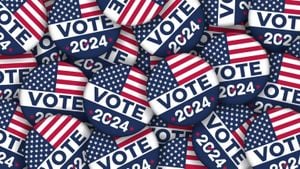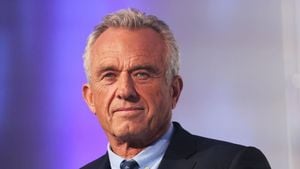California is witnessing a notable shift as the political climate within the state reflects broader changes sweeping through the nation. The 2024 elections, with the bulk of its votes still being counted, have already shown substantial impacts indicative of increasing conservative sentiment. Amidst this backdrop, cities within the state are reeling from the results, particularly as voters express dissatisfaction with prevailing progressive policies.
One of the most significant developments has emerged from San Francisco, historically viewed as emblematic of liberal values. During the latest election, approximately 15% of voters chose Donald Trump, up from 9.3% during his first run four years ago. This marks the highest percentage of Republican votes garnered by any presidential candidate within the city over the last two decades. Local Republicans see this as potential momentum to reinvigorate their presence and influence.
The fraying edges of California’s liberal fabric could be traced back to rising crime rates and discontent over homelessness—a stark indication of public sentiment shifting under the weight of these challenges. The San Francisco mayoral race offers stark evidence of this trend. Daniel Lurie, largely considered an outsider with no previous political experience, unseated incumbent Mayor London Breed. Voters turned to him, driven by the idea of reversing the city's growing fentanyl crisis and homelessness issues, highlighting the electorate’s weariness with the status quo.
Meanwhile, the political shake-up didn't stop at the mayor's office. The electorate also bore downs on progressive district attorneys. Oakland’s Sheng Thao and Alameda County’s Pamela Price were ousted amid perceptions of rising crime. Their downfall reflects larger dissatisfaction as voters focus on practical solutions rather than punitive measures. Chesa Boudin, the former San Francisco district attorney, had already tasted defeat last year when he was recalled, indicating the growing pushback against progressive justice policies.
Reflecting this discontent, Proposition 36, which reinstated tougher penalties for drug possession and theft, was overwhelmingly approved by 70% of voters statewide. This reversal starkly contrasts earlier measures, like Prop 47, which aimed to reduce incarceration rates and instead treat drug offenses more leniently. With Proposition 36, the threshold for misdemeanor thefts is effectively eliminated, turning repeated petty crimes (theft or drug possession) akin to greater felonious offenses.
Perhaps more surprising was the significant loss suffered by George Gascón, Los Angeles County’s district attorney. Known for his progressive approach to justice, Gascón lost to Nathan Hochman, whose campaign centered on scaling back his predecessor's reforms and emphasized making crime “illegal again.” Hochman’s victory by over 600,000 votes marks another signal of the conservative grip tightening within California’s largest cities.
Interestingly, even with widespread backing for Democrats at the state level—where both President Biden and Vice President Kamala Harris won successfully by sizable margins—the local races tell another story. Although Democrats commanded state-wide elections, local voters have distinct preferences, as evidenced by their directives to local officials. Harris might have carried the state with 58% of votes, but districts once secure for her party saw local officials lose ground.
Election experts point to various reasons behind these shifts. Increasing concerns over crime and homelessness have overshadowed previous narratives from 2020, when progressive movements surged following social equity protests. The pandemic has intensified many existing sentiments, leaving Californians disenchanted with existing policies, often feeding directly from sensationalized media portrayals of crime and disorder—which advocates of harsher policies have capitalized upon.
Prominent figures within the Republican party are taking note of the moment, hoping to capitalize on the dissatisfaction felt throughout the voter base. "This shows there’s an opportunity for Republican candidates who can have success," noted Jay Donde, co-founder of the San Francisco Briones Society. The ripple effects of these changes could already be felt, with some Republican donors slowly re-engaging amid this growing wave of support.
Experts warn, though, against viewing the current push against progressive reforms as a definitive rejection of all criminal justice reform efforts. While Proposition 36 shatters previous principles established under Prop 47, advocacy group leaders caution against overgeneralizations about public sentiment's direction. Miriam Krinsky, who leads Fair and Just Prosecution, emphasizes caution and perspective, noting moments of fluctuation often accompany these political waves, warning to not see complete failure where progress can still be claimed.
Despite these political movements, advocates must navigate the complex realities of how policies will shape and influence lives moving forward. Disproportionate sociopolitical narratives can often distort perceptions, making it imperative for reform advocates to connect and communicate effectively with voters. The broader electorate’s yearning for safety—both real and perceived—dictates future policies and sends ripples through the political atmosphere.
Others remain skeptical of immediate Republican resurgence within traditionally blue locales like San Francisco. Political scientist Jason McDaniel warns against expecting significant Republican wins anytime soon. The enduring associations with Trump's national persona may overshadow local candidates trying to distance themselves from those identities.
By all appearances, tensions continue to rise as the state holds its breath. The future paths California politicians chart may determine whether these moments crystallize as fleeting or proof of substantive change. Overall, it remains clear: California’s political identity remains contested, reflective of the unique challenges and sentiments inside one of America’s most progressive states—pushing the envelope on how both sides navigate upcoming election terrains.



